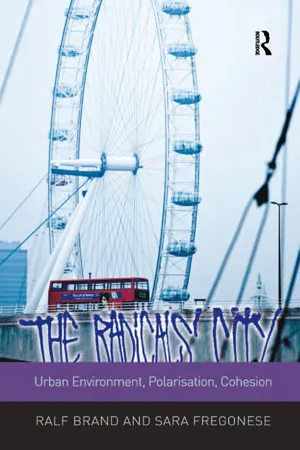
- 216 pages
- English
- ePUB (mobile friendly)
- Available on iOS & Android
The Radicals' City: Urban Environment, Polarisation, Cohesion
About This Book
Bringing together comparative case studies from Belfast, Beirut, Amsterdam and Berlin, this book examines the role of the urban environment in social polarisation processes. In doing so, it provides a timely and refreshingly innovative voice in the confusing babble on (counter-)terrorism, urban conflict and community cohesion. Despite their socio-political differences, these cities are telling cases of how the location and shape of very mundane objects such as rubbish bins, bridges, clothes' stores, shopping malls and cafés - in addition to the obvious fences, walls and barbed wire - are often subject to heated controversies and influence the way urban conflict is 'lived' and practised. Within a Science and Technology Studies (STS) theoretical framework, the authors provide a systematic analysis of these four cities and provide many concrete and richly illustrated examples of 'material agency' without losing sight of their specific historical, political, geographical and social conditions. The STS angle permits some surprising, yet extremely convincing, conclusions which are of use not only for a range of practitioners but also to scholars interested in the social shaping processes and the consequences of urban artefacts. The authors argue that, although architecture and urban design is clearly not the sole cause of conflict and polarisation, neither is it completely innocent. Conversely, it cannot be the silver bullet to solve related problems and to create community cohesion. However, the materiality of our cities must not be ignored; in fact, it can and should be 'enrolled' in our efforts. The book contains detailed descriptions of such positive cases as inspiration for practitioners as diverse as policy makers, architects, urban designers, planners, community workers, consultants or police officers.
Frequently asked questions
Information
Table of contents
- Cover Page
- Dedication
- Title Page
- Copyright Page
- Contents
- List of Figures
- List of Maps
- Notes on Contributors
- Acknowledgements
- List of Abbreviations and Acronyms
- 1 Introduction
- 2 The Urban Environment: Mirror and Mediator of Radicalisation?
- 3 Polarisation as a Socio-Material Phenomenon: A Bibliographical Review
- 4 The Belfast Case
- 5 The Beirut Case
- 6 The Berlin Case
- 7 The Amsterdam Case
- 8 Implications for Planning Practice and Policy
- 9 Interviews
- 10 Epilogue From Polarisation to Shared Spaces: The Influence of the Built Environment in Contested Societies
- References
- Index